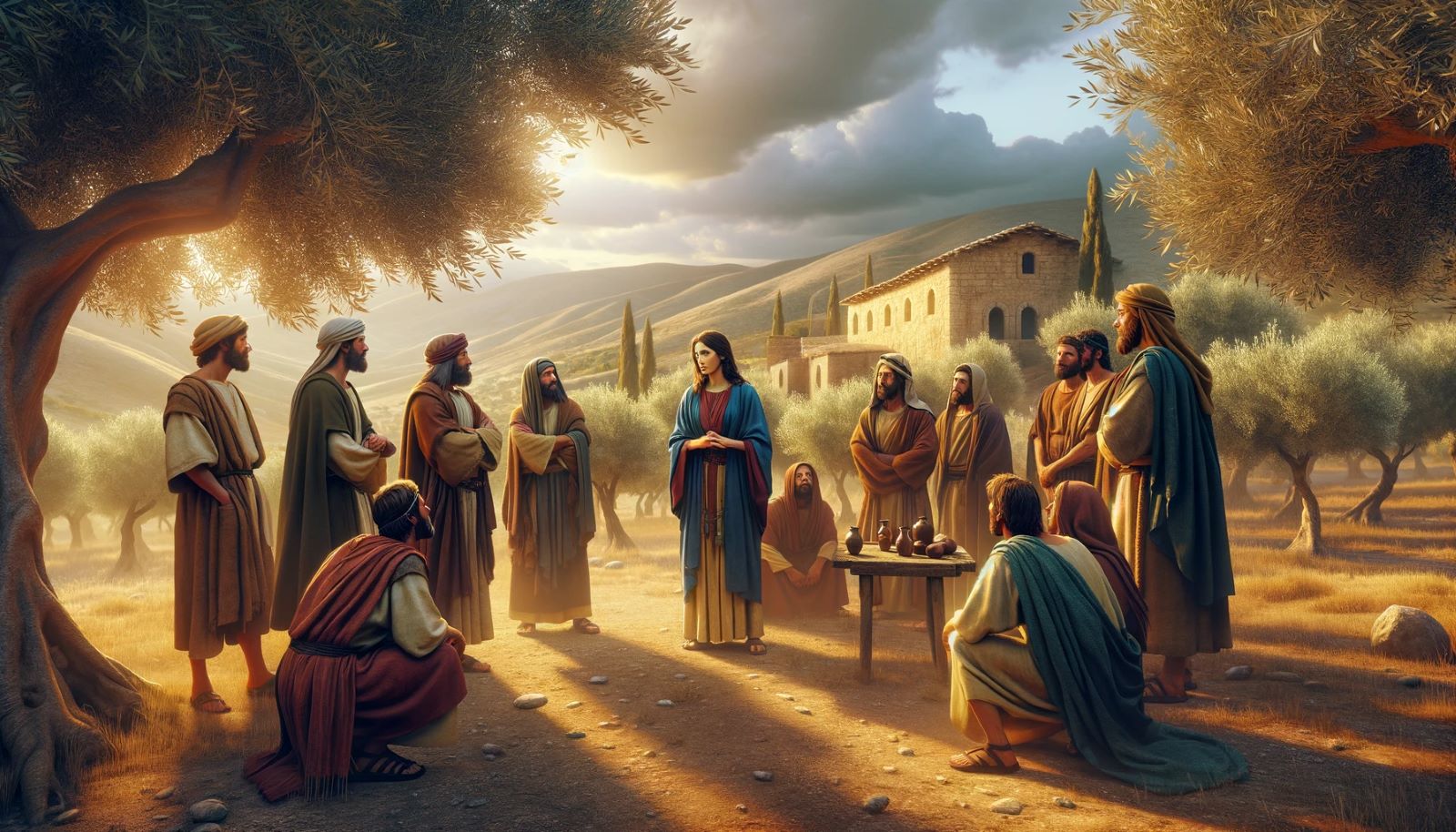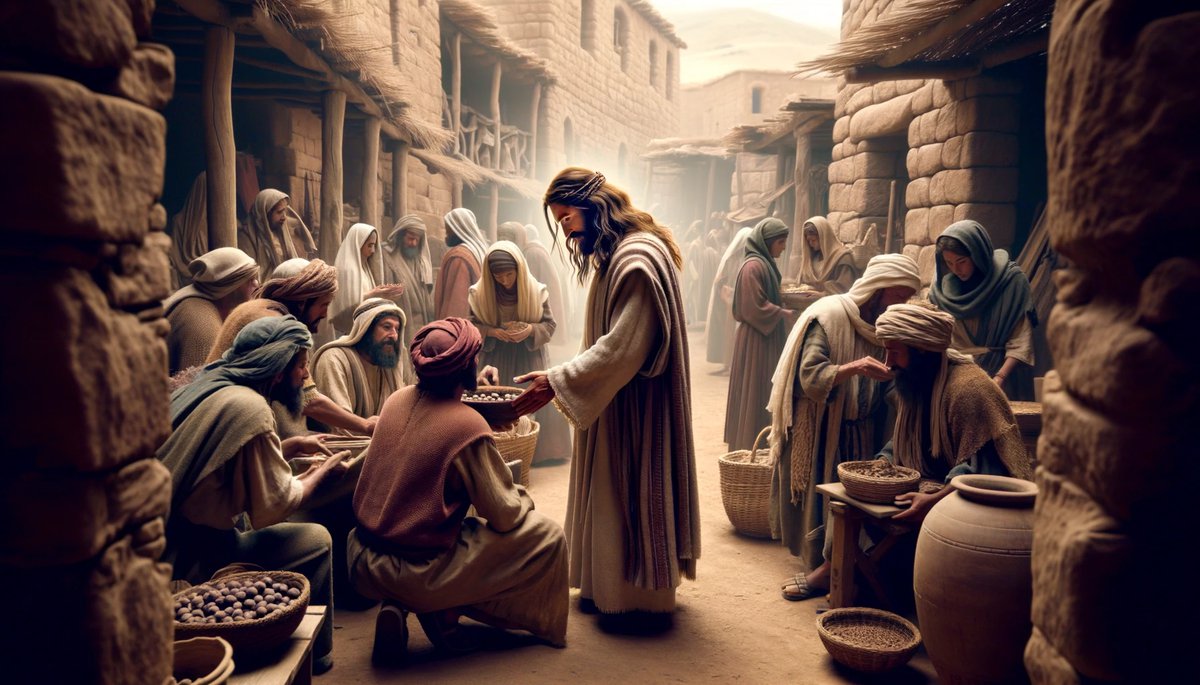Home>Bible Facts>How Many Apostles Jesus Had


Bible Facts
How Many Apostles Jesus Had
Published: February 17, 2024
Jason DeRose, Managing Editor at Christian.net, uses his expertise in religion and journalism to deepen understanding of faith's societal impacts. His editorial leadership, coupled with a strong academic background, enriches the platform’s diverse content, earning him recognition in both journalism and religious circles.
Discover fascinating Bible facts about the number of apostles Jesus had and deepen your understanding of Christian history and teachings. Explore the significance of this pivotal aspect of the Bible.
(Many of the links in this article redirect to a specific reviewed product. Your purchase of these products through affiliate links helps to generate commission for Christian.net, at no extra cost. Learn more)
Table of Contents
Introduction
The number of apostles Jesus had is a topic of great significance and intrigue in Christian theology. Understanding the composition of Jesus' apostolic circle provides valuable insights into the early spread of Christianity and the foundational figures who played pivotal roles in its establishment. Delving into the historical and biblical accounts, we can unravel the distinct groups of individuals who were closely associated with Jesus during his ministry on earth.
The apostles, disciples, and followers of Jesus formed a diverse and dedicated community, each contributing to the propagation of his teachings and the establishment of the Christian faith. By exploring the different categories of individuals who were part of Jesus' inner circle, we can gain a deeper appreciation for the multifaceted nature of his influence and the diverse array of individuals who were instrumental in carrying forth his message.
Understanding the distinctions between the Twelve Apostles, the Seventy Disciples, and the broader community of followers and disciples allows us to comprehend the breadth and depth of Jesus' impact on those who encountered him. This exploration not only sheds light on the historical context of the early Christian movement but also provides valuable insights into the diverse array of individuals who were touched by Jesus' teachings and empowered to share his message with the world.
As we embark on this exploration of the individuals who comprised Jesus' inner circle, we will uncover the unique roles and contributions of each group, illuminating the rich tapestry of personalities and experiences that shaped the early Christian community. Through this journey, we will gain a profound understanding of the profound impact of Jesus' ministry and the enduring legacy of those who heeded his call to spread the message of love, compassion, and salvation.
Read more: How Many James Were Apostles
The Twelve Apostles
The Twelve Apostles, also known as the Twelve Disciples, were a select group of individuals chosen by Jesus to accompany him during his earthly ministry. Their significance in Christian history and theology is profound, as they were entrusted with the responsibility of spreading Jesus' teachings and establishing the foundation of the Christian faith.
According to the New Testament, the Twelve Apostles were Simon Peter, Andrew, James (the son of Zebedee), John, Philip, Bartholomew, Thomas, Matthew, James (the son of Alphaeus), Thaddaeus, Simon the Zealot, and Judas Iscariot. Each apostle brought a unique set of skills, experiences, and perspectives to the group, reflecting the diversity of backgrounds and personalities that Jesus embraced in his selection.
Simon Peter, often regarded as the leader of the Twelve, exhibited unwavering faith and became a prominent figure in the early Christian church. Andrew, Peter's brother, was known for his humility and dedication to spreading the gospel. James and John, the sons of Zebedee, were known as the "Sons of Thunder" and were among Jesus' inner circle, witnessing pivotal events such as the Transfiguration.
Philip and Bartholomew, also known as Nathanael, were instrumental in sharing the message of Jesus beyond the confines of Judea. Thomas, often remembered for his initial skepticism, later became a staunch believer, earning the epithet "Doubting Thomas." Matthew, a tax collector, defied societal norms by answering Jesus' call, exemplifying the transformative power of Jesus' message.
James, the son of Alphaeus, Thaddaeus, and Simon the Zealot, though less prominently featured in the gospel accounts, played integral roles in the early Christian community. Judas Iscariot, infamous for betraying Jesus, serves as a cautionary figure, illustrating the complexities of human nature and the challenges faced by those called to bear the message of Christ.
The Twelve Apostles were witnesses to Jesus' miracles, parables, and teachings, and they were commissioned to continue his work after his ascension. Their diverse backgrounds and personalities underscored the universal nature of Jesus' message, transcending societal boundaries and embracing individuals from all walks of life.
The Twelve Apostles' unwavering commitment to spreading the gospel laid the groundwork for the global expansion of Christianity. Their collective efforts, coupled with the indelible impact of Jesus' teachings, continue to resonate across continents and centuries, shaping the faith and lives of countless believers.
In examining the Twelve Apostles, we gain a profound appreciation for the transformative power of Jesus' ministry and the enduring legacy of those who responded to his call. Their collective journey exemplifies the profound impact of faith, unity, and purpose, serving as an enduring testament to the enduring influence of Jesus' teachings and the indomitable spirit of those who heeded his call.
The Seventy Disciples
In addition to the Twelve Apostles, Jesus also appointed seventy disciples to assist in spreading his message and ministering to the people. This group, often referred to as the Seventy Disciples or Seventy-two Disciples, played a crucial role in extending the reach of Jesus' teachings and preparing the communities for his visits.
The appointment of the Seventy Disciples is recorded in the Gospel of Luke (10:1-24), where Jesus commissions them to go ahead of him to every town and place he intended to visit. Their mission was to proclaim the arrival of the Kingdom of God, heal the sick, and prepare the hearts of the people to receive Jesus' message of salvation.
While the names of the seventy disciples are not explicitly listed in the biblical accounts, their collective significance in Jesus' ministry is undeniable. Their role in laying the groundwork for Jesus' ministry exemplifies the collaborative and inclusive nature of his mission, extending beyond the immediate circle of the Twelve Apostles.
The appointment of the Seventy Disciples underscores Jesus' emphasis on community and shared responsibility in advancing the Kingdom of God. Their diverse backgrounds and experiences mirrored the inclusive nature of Jesus' message, transcending societal barriers and embracing individuals from various walks of life.
The Seventy Disciples' mission foreshadowed the universal scope of Jesus' teachings, emphasizing the imperative of reaching out to all corners of society with the message of hope and redemption. Their collective efforts contributed to the widespread dissemination of Jesus' message, fostering a sense of anticipation and receptivity among the communities they visited.
The Seventy Disciples' unwavering commitment to their mission serves as a testament to the transformative power of Jesus' message and the enduring impact of those who wholeheartedly embraced his call. Their collaborative endeavors, coupled with the unwavering dedication of the Twelve Apostles, laid the foundation for the global expansion of Christianity, leaving an indelible mark on the course of human history.
In reflecting on the significance of the Seventy Disciples, we gain a deeper understanding of the inclusive and communal nature of Jesus' ministry. Their collective mission exemplifies the profound impact of collaboration, unity, and shared purpose in advancing the message of Christ, underscoring the enduring legacy of those who responded to his call with unwavering dedication and faith.
Other Followers and Disciples
Beyond the Twelve Apostles and the Seventy Disciples, Jesus had a multitude of other followers and disciples who played integral roles in his ministry and the early spread of Christianity. These individuals, often overlooked in traditional accounts, were nonetheless instrumental in carrying forth Jesus' message and embodying the principles of love, compassion, and faith that he espoused.
The broader community of followers and disciples encompassed men and women from diverse backgrounds, each contributing their unique talents and resources to support Jesus' mission. Among them were prominent figures such as Mary Magdalene, Joanna, Susanna, and many others who provided for Jesus and his disciples out of their own means (Luke 8:1-3). Their unwavering dedication and financial support enabled Jesus and his followers to carry out their itinerant ministry, demonstrating the vital role of generosity and hospitality in sustaining the early Christian movement.
Furthermore, the Gospel accounts highlight the encounters of numerous individuals who sought healing, guidance, and spiritual nourishment from Jesus. Their transformative experiences and unwavering faith exemplify the profound impact of Jesus' ministry on a diverse array of individuals, transcending societal barriers and embracing the marginalized and disenfranchised.
The parables and teachings of Jesus resonated deeply with the common people, drawing crowds from various regions to hear his message of hope and redemption. The collective impact of these encounters reverberated throughout the communities, fostering a sense of anticipation and receptivity to the transformative power of Jesus' teachings.
The diverse array of individuals who comprised the broader community of followers and disciples exemplifies the universal appeal of Jesus' message, transcending cultural, social, and economic divides. Their collective dedication and unwavering faith underscore the enduring legacy of those who were touched by Jesus' ministry, contributing to the enduring spread of Christianity across the centuries.
In reflecting on the contributions of the other followers and disciples, we gain a profound appreciation for the inclusive and transformative nature of Jesus' ministry. Their collective efforts, coupled with the unwavering commitment of the Twelve Apostles and the Seventy Disciples, laid the groundwork for the global expansion of Christianity, leaving an indelible mark on the course of human history.
Conclusion
In conclusion, the composition of Jesus' apostolic circle, comprising the Twelve Apostles, the Seventy Disciples, and the broader community of followers and disciples, reflects the diverse array of individuals who were touched by his teachings and empowered to carry forth his message. The Twelve Apostles, chosen by Jesus to accompany him during his earthly ministry, exemplified the universal nature of his message, transcending societal boundaries and embracing individuals from varied backgrounds. Their unwavering commitment to spreading the gospel laid the foundation for the global expansion of Christianity, leaving an indelible mark on the course of human history.
The appointment of the Seventy Disciples further underscored the inclusive and communal nature of Jesus' ministry, emphasizing the imperative of reaching out to all corners of society with the message of hope and redemption. Their collaborative efforts contributed to the widespread dissemination of Jesus' message, fostering a sense of anticipation and receptivity among the communities they visited. The Seventy Disciples' mission foreshadowed the universal scope of Jesus' teachings, emphasizing the imperative of reaching out to all corners of society with the message of hope and redemption.
Furthermore, the contributions of the broader community of followers and disciples, often overshadowed in traditional accounts, were nonetheless instrumental in carrying forth Jesus' message and embodying the principles of love, compassion, and faith that he espoused. Their unwavering dedication and financial support enabled Jesus and his followers to carry out their itinerant ministry, demonstrating the vital role of generosity and hospitality in sustaining the early Christian movement.
In reflecting on the collective impact of the Twelve Apostles, the Seventy Disciples, and the broader community of followers and disciples, we gain a profound appreciation for the transformative power of Jesus' ministry and the enduring legacy of those who responded to his call. Their collaborative endeavors, coupled with the unwavering dedication of the Twelve Apostles and the Seventy Disciples, laid the foundation for the global expansion of Christianity, leaving an indelible mark on the course of human history.
In essence, the diverse array of individuals who comprised Jesus' inner circle exemplifies the universal appeal of his message, transcending cultural, social, and economic divides. Their collective dedication and unwavering faith underscore the enduring legacy of those who were touched by Jesus' ministry, contributing to the enduring spread of Christianity across the centuries. Through their unwavering commitment and collaborative efforts, they exemplified the profound impact of faith, unity, and purpose, serving as an enduring testament to the enduring influence of Jesus' teachings and the indomitable spirit of those who heeded his call.















